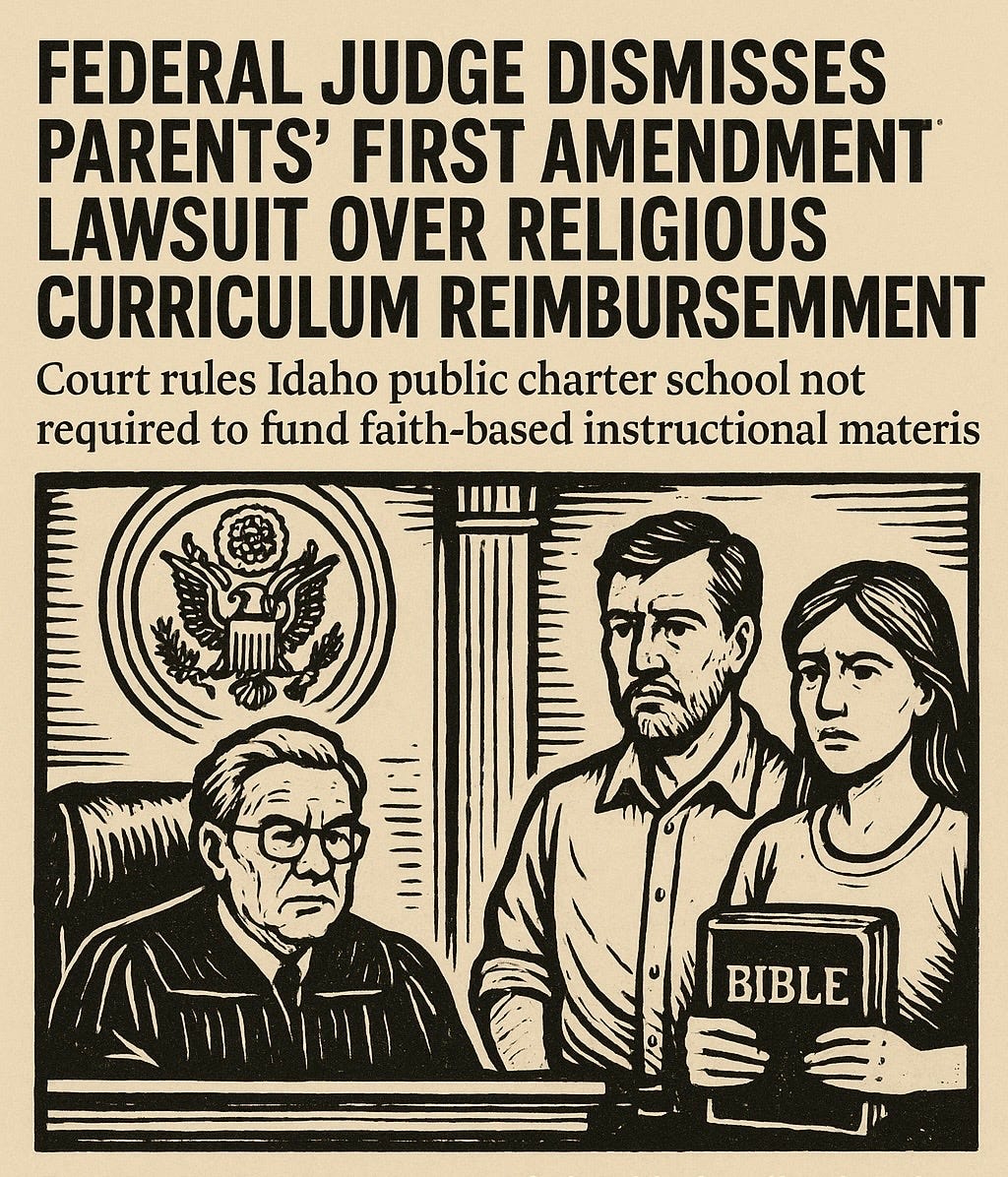Court rules Idaho public charter school not required to fund faith-based instructional materials
TL;DR (“too long; didnt read”) summary:
On August 6, 2025, U.S. District Judge B. Lynn Winmill dismissed a lawsuit by Chris and Nicole Trakel against Idaho Superintendent Debbie Critchfield. The Trakels claimed the Idaho Home Learning Academy violated their First Amendment rights by denying reimbursement for religious curriculum materials. The court found jurisdiction was proper but held that public schools are not obligated to provide or fund religious instruction. The decision, citing similar rulings in Idaho and California, emphasized that while parents may provide religious education privately, the Constitution does not require public schools to include it. The dismissal with prejudice ends the case against Critchfield, preventing it from being refiled in federal court.
On August 6, 2025, a federal judge dismissed Chris and Nicole Trakel’s lawsuit against Idaho Superintendent Debbie Critchfield. The Trakels claimed that the Idaho Home Learning Academy violated their First Amendment rights by refusing to reimburse them for religious curriculum materials. The court found jurisdiction was proper but ruled that public schools are not obligated to provide or fund religious instruction. The dismissal was with prejudice, ending the case against Critchfield.
The Idaho Home Learning Academy’s reimbursement program was at the heart of the dispute, but Senior U.S. District Judge B. Lynn Winmill concluded that the plaintiffs had no constitutional right to compel a public charter school to include religious instruction in its curriculum. While the court acknowledged that parents can provide their children with religious education privately, it drew a firm legal line against requiring a public school to do so.
Chris and Nicole Trakel, practicing Christians with two children enrolled at IHLA, purchased supplemental religious materials such as a handwriting curriculum using Bible verses. The school denied reimbursement based on Idaho’s Blaine Amendment, which prohibits the use of public funds for religious purposes. The Trakels argued that the denial violated the Free Exercise and Free Speech Clauses of the First Amendment.
Superintendent Critchfield sought dismissal, arguing both lack of jurisdiction and failure to state a claim. Judge Winmill found jurisdiction existed because of Critchfield’s statutory role overseeing public education, but ruled against the plaintiffs on the merits. The court determined IHLA’s reimbursement program was part of its public school curriculum, not an open benefit program like those in prior Supreme Court cases involving religious funding.
Citing cases such as Bowen v. Roy and Pleasant Grove City v. Summum, the court explained that the First Amendment does not entitle parents to dictate public school curricula or require public schools to teach religion. Similar lawsuits in Idaho (Nampa Classical Academy v. Goesling) and California (Woolard v. Thurmond) were also dismissed on the same grounds.
Plain-Language Legal Commentary
This case boiled down to a fundamental but often misunderstood principle: the First Amendment protects the right of individuals to practice their religion, but it does not give them the power to make the government practice it for them. The Trakels argued that because the Idaho Home Learning Academy reimburses families for some self-selected educational materials, refusing to reimburse religious ones was unconstitutional. On the surface, this may sound similar to Supreme Court cases like Espinoza or Carson, where religious schools were included in general funding programs.
But Judge Winmill drew an important distinction. In Carson and similar cases, the state provided a general benefit—money to spend at any school the family chose. Here, the “benefit” was not open-ended cash; it was participation in a public school curriculum, even if that curriculum allowed some customization. Once reimbursement turns the materials into part of the school’s curriculum, it becomes government speech. And the government can decide that its speech—its official curriculum—will be secular.
This is where the First Amendment’s Free Exercise and Establishment Clauses bump into each other. If the court had ruled for the Trakels, it would have meant compelling a public school to adopt religious content, raising serious establishment concerns. Instead, the judge reaffirmed that while parents can freely teach religion at home or through private institutions, public schools are entitled to set their own educational content without being forced to adopt religious messages.
In practical terms, this ruling is a reminder: constitutional protections for religious freedom are strong, but they stop short of obligating the government to join in religious instruction. That line, however, will continue to be tested—especially in cases where public school programs resemble private-choice funding schemes.
The ruling leaves the Trakels without a federal avenue to challenge the reimbursement denial. Because the dismissal is with prejudice, the claims against Critchfield cannot be refiled in federal court. Any further legal action would need to target different defendants or raise different claims.
Tags: Idaho Blaine Amendment, First Amendment, public charter school, religious curriculum, federal court ruling
AI Disclaimer: This article was prepared using AI assistance and is based solely on the contents of the court decision in Trakel et al. v. Critchfield et al., Case No. 1:25-cv-00115-BLW, U.S. District Court for the District of Idaho, filed August 6, 2025 available here:
https://cases.justia.com/federal/district-courts/idaho/iddce/1:2025cv00115/56455/15/0.pdf?ts=1754560519
